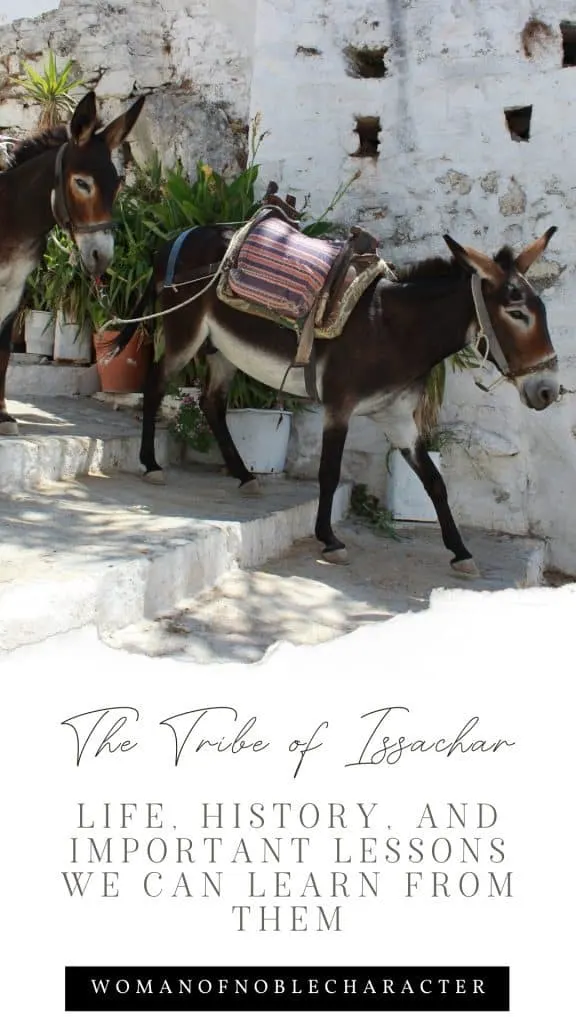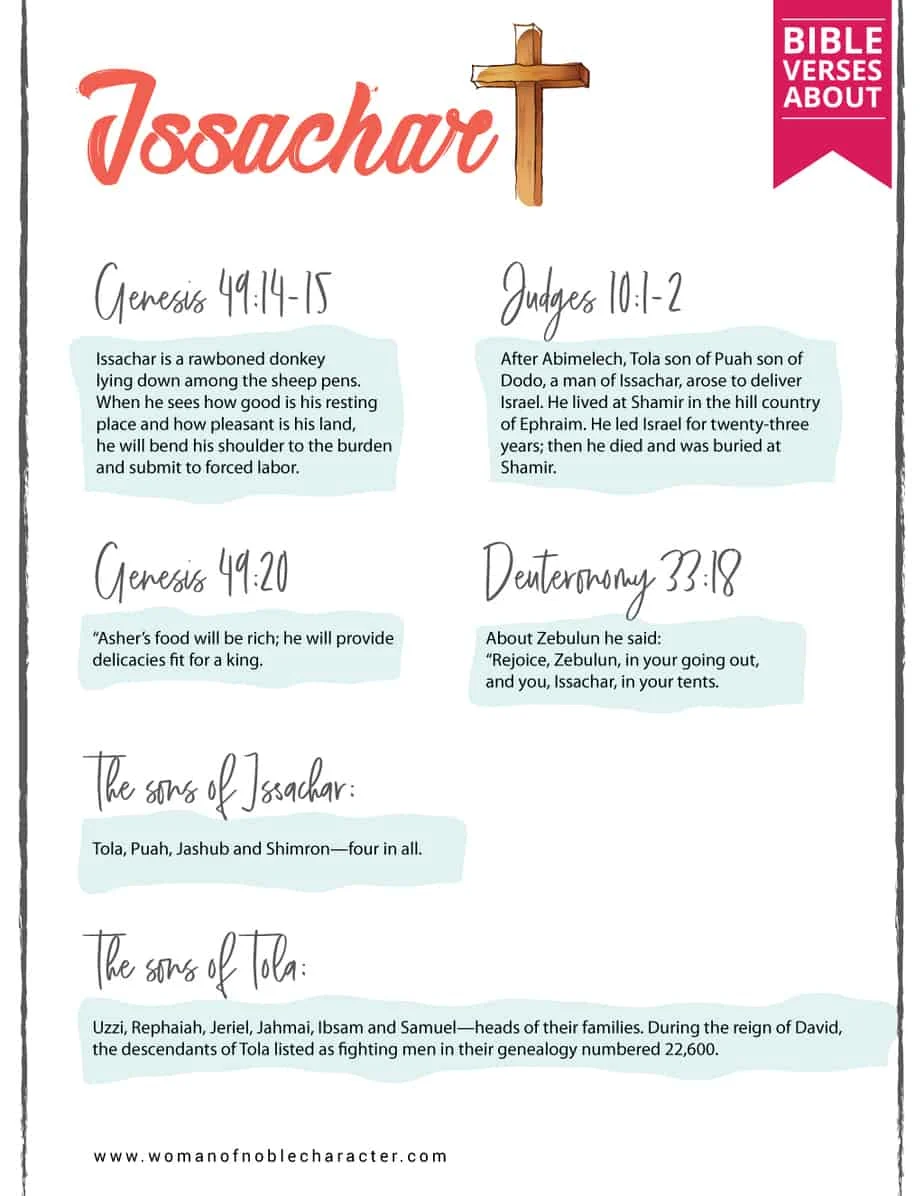This page/post may contain affiliate links. As an Amazon Associate, as well as an affiliate of other programs, this means if you purchase something using these links, I will receive a commission on qualifying purchases at no cost to you! For more detailed information, please visit our Affiliate Disclaimer page
The Tribe of Issachar. Whew! We are already on our ninth tribe of Israel!
(You can find previous tribes here: Reuben, Simeon, Judah, Gad, Dan, Levi, Naphtali and Asher,

Issachar was the ninth son of Leah and father to one of the twelve tribes of Israel.
One interpretation of his name is “man of reward” (Hebrew: shcar). Issachar was the product of the mandrake incident (Genesis 30:9-18) and is a full brother of Zebulun.
Issachar was also involved in the plot to sell his brother Joseph into slavery. Eventually, Issachar settled in Egypt after the famine in Canaan.
The first important event in which Issachar plays an important role is in the battle of Deborah and Barak with Sisera in the plain of Esdraelon.
the princes of Issachar came with Deborah,
Judges 5:15
and Issachar faithful to Barak;
into the valley they rushed at his heels.
Among the clans of Reuben
there were great searchings of heart.

Some biblical scholars agree, but some do not that both Deborah and Barak belonged to this tribe, in whose territory the battle was fought and won.
After Abimelech there arose to save Israel Tola the son of Puah, son of Dodo, a man of Issachar, and he lived at Shamir in the hill country of Ephraim. And he judged Israel twenty-three years. Then he died and was buried at Shamir.
Judges 10:1-2
Judge Tola, son of Puah, son of Dodo, was also a man of Issachar. Jehoshaphat, son of Paruah, was one of Solomon’s commissary officials (I Kings:17). The second dynasty of the Northern Kingdom belonged to Issachar: “And Baasha, the son of Ahijah, of the house of Issachar.” slew Nadab, son of Jeroboam I., and reigned in his stead. There are no other specific references to descendants of Issachar who occupied prominent places in Israel’s history.
Blessing from His Father Jacob and the Prophecy of the Church Today
Jacob’s prophesying with blessing concerning Issachar is recorded in Gen. 49:14-15 where he says, Issachar is a strong donkey, crouching between the sheepfolds. And he saw a resting place that was good and the land that was pleasant, and he bowed his shoulder to bear, and became a task-worker…
“Issachar is a strong donkey,
Genesis 49:14-15
crouching between the sheepfolds.
He saw that a resting place was good,
and that the land was pleasant,
so he bowed his shoulder to bear,
and became a servant at forced labor.
When speaking of Judah, Jacob said that he’s binding his donkey to the vine – and this typifies the fact that we have reached our destination; we are now enjoying Christ as the vine into which we were grafted.
When speaking of Issachar, Jacob says that he’s a strong donkey couching between the sheepfolds. This means that we are resting in satisfaction “among the sheepfolds” – not “in the sheepfolds” but among the sheepfolds. A sheepfold is a place where the sheep are kept until the shepherd comes to take them out into the pasture.
When the Lord Jesus came as the good Shepherd, He called out His sheep out of the sheepfold of Judaism, and His sheep heard His voice and followed Him.
“Truly, truly, I say to you, he who does not enter the sheepfold by the door but climbs in by another way, that man is a thief and a robber. But he who enters by the door is the shepherd of the sheep. To him the gatekeeper opens.
John 10:1-9
The sheep hear his voice, and he calls his own sheep by name and leads them out. When he has brought out all his own, he goes before them, and the sheep follow him, for they know his voice. A stranger they will not follow, but they will flee from him, for they do not know the voice of strangers.” This figure of speech Jesus used with them, but they did not understand what he was saying to them.
So Jesus again said to them, “Truly, truly, I say to you, I am the door of the sheep. All who came before me are thieves and robbers, but the sheep did not listen to them. I am the door. If anyone enters by me, he will be saved and will go in and out and find pasture.
And I have other sheep that are not of this fold. I must bring them also, and they will listen to my voice. So there will be one flock, one shepherd.
John 10:16
Today there are many sheepfolds – the many denominations are sheepfolds, denominational folds based on some laws. But we in the Lord’s recovery are not in the fold; we are couching among the sheepfolds. We are enjoying Christ in rest and satisfaction with the saints outside of any religious practice and denomination.
Blessing from Moses
The blessing of Moses is joined with the blessing of Zebulun, as is the case with much scripture.
And of Zebulun he said,
Deuteronomy 33:18
“Rejoice, Zebulun, in your going out,
and Issachar, in your tents.
The rabbis interpret the blessing to Zebulun “in your going out” as a blessing in trading and business, and they interpret the blessing to Issachar “as you stay home” as a blessing.
Zebulun and Issachar were full brothers, both sons of Jacob and Leah. Gad was a half-brother, son of Jacob, and Leah’s maid Zilpah. Again, we see that God is not a “respecter of persons,” but knows and forms us each individually. The full brothers Zebulun and Issachar are given almost opposite blessings, and presumably opposite skills and personalities
What hope for each of us. Our future is not determined by our parentage or birth order but by God’s plans and blessings for our lives. We join the psalmist David in proclaiming:
Your eyes saw my unformed substance;
Psalm 139:16-17
in your book were written, every one of them,
the days that were formed for me,
when as yet there was none of them.
How precious to me are your thoughts, O God!
How vast is the sum of them!

Blessing Comparison with Judah
Issachar was described as a “Strong-boned Ass” or donkey. Issachar is a strong donkey, lying down between the sheepfolds. When he saw that a resting place was good and that the land was pleasant, he bowed his shoulder to bear burdens and became a slave at forced labor.
Issachar is a strong donkey,
Genesis 49:14-16
crouching between the sheepfolds.
He saw that a resting place was good,
and that the land was pleasant,
so he bowed his shoulder to bear,
and became a servant at forced labor.
“Dan shall judge his people
as one of the tribes of Israel.
Issachar’s blessing has much in common with Judah’s. Both are described as crouching down, Judah as a lion and a royal warrior, and Issachar as a donkey between the sheepfolds, a prophet-shepherd. Issachar lies down to guard the two sheepfolds, perhaps Israel and Judah or the native-born to the covenant and those from the nations who would join themselves to Israel.
Donkeys are often turned out to pasture with cattle or other livestock to protect them from coyotes or other predators. They not only work hard, but they are fiercely protective of the herd. The name Yissachar means a reward, or repayment, a wage. With Judah and Issachar, we see a paradox of the Kingdom of Heaven. Rulership is the reward of humility, service, and patience, the spirit of prophecy.
Issachar’s blessing was to be an ass: to serve, bow, protect the sheep, and perform hard work. Yet, his very name implies that he will be rewarded for this seemingly mundane blessing. To serve one another is a blessing, and it is the spirit of prophecy because those who serve are doing the deeds of Yeshua. This steady, patient service is necessary in the assemblies of Adonai because it was the tribe of Issachar who was faithful in times of war. The lowly ass is the same symbol for the Jewish warrior who washes his robes in the blood of grapes, a metaphor for war in the Prophets.
Judge Deborah‘s and Barak’s fight against the iron chariots of Sisera was not fought with pride, but humility. Deborah didn’t fight back with horses of pride; she saddled her ass and fought back with strong-boned donkey servants: the tribe of Issachar!
Wait a minute, wasn’t it the tribe of Dan who was blessed to strike at the horses’ heels? But they stayed in their ships! Too lazy? Too busy with their own affairs? Didn’t like Barak? Didn’t want to follow a woman? What was it? Regardless, it was Issachar who exercised Dan’s blessing in battle.
Later in Scripture, the tribe of Issachar again is mentioned as great warriors, and again they are at the forefront of the army, rallying to the anointed king David to unite Israel, moving in the spirit of prophecy. 1 Chronicles 12:23-40 is one example:
Now, these are the numbers of the divisions equipped for war, who came to David at Hebron, to turn the kingdom of Saul to him, according to the word of the LORD. Of the sons of Issachar, men who understood the times, with knowledge of what Israel should do, their chiefs were two hundred; and all their kinsmen were at their command.
All these, being men of war who could draw up in battle formation, came to Hebron with a perfect heart to make David king over all Israel; and all the rest also of Israel were of one mind to make David king. They were there with David for three days, eating and drinking, for their kinsmen had prepared for them. Moreover, those who were near to them, even as far as Issachar and Zebulun and Naphtali, brought food on donkeys, camels, mules and on oxen, great quantities of flour cakes, fig cakes and bunches of raisins, wine, oil, oxen and sheep.
The patience of a strong-boned donkey is necessary to cultivate an understanding of the times, especially the festival times for the King. The right thing can be done at the wrong time, but the wise, strong-boned ass discerns and rises up to protect the sheep at the right time.
The blessings on each tribe are not exclusive to each tribe. The tribes of Israel are the FAMILY of Israel. When someone refuses the job and forfeits that opportunity to operate in his or her blessing, then another family member may put her shoulder to the burden and carry it.
The example of Issachar is that the individual who submits to the less-than-glorious service to others will be raised up to war like the lion of Judah’s blessing and Dan’s tactical serpent biting the rider’s heels and judging their people with wise chiefs.
The Patient Tribe of Issachar was Blessed With:
- the sword of Shimon and Levi because he was not cruel to the livestock but protected them. He was not angry and vengeful like Shimon and Levi, but he knew that a resting place was good.
- being able to put his hand on the neck of his enemies like Judah
- being a tribe who discerns the times, so they can speak beautiful words like Naphtali
- fighting like Gad, a troop raiding the enemy
- being a wolf in warlike Benjamin, tearing the enemy
- the steady bow like Joseph
- chiefs blessed with the wise dignity of the firstborn Reuben
Is it such a bad thing to become a servant to hard donkey labor, shepherding flocks of sheep? This is the very preparation for difficult times. Patient study in the Word and a commitment to menucha (in Hebrew, a resting place) for Israel, shows that Issachar understands the times and preparation needed. The patience of Issachar is preparation for tribulation.
Such traits characterize the family of Israel, for from there will come the Shepherd:
The Coming of Zion’s King
Rejoice greatly, O daughter of Zion!
Zechariah 9:9
Shout aloud, O daughter of Jerusalem!
Behold, your king is coming to you;
righteous and having salvation is he,
humble and mounted on a donkey,
on a colt, the foal of a donkey.
Patiently bearing our burdens of protecting and pasturing the flocks leads to great skill in the day of battle. If we are a family, then my blessing is your blessing, and your blessing is mine. It’s not MY ministry. It’s OUR ministry. This is the family of Israel, “with a perfect heart to make David king over all Israel.”
The Descendants of Issachar
Upon examining information from prophecy, as well as biblical and secular history, the locations of the remaining tribes can be discovered, but not with certainty. The tribe of Issachar is said to have settled in Finland, and his full brother, Zebulun, in Holland (the Netherlands). However, some biblical scholars say that the tribe of Issachar’s descendants settled in Mexico.
Issachar was the father of four sons: Tola, Puah, Jashub, and Shimron.
Tola was the father of Uzzi, Rephaiah, Jeriel, Jahmai, Ibsam, and Shemuel, who were all brave soldiers and family leaders in their clan. There were 22,600 people in Tola’s family by the time David became king.
Uzzi was the father of Izrahiah and the grandfather of Michael, Obadiah, Joel, and Isshiah, who were also family leaders. Their families were so large that they had 36,000 soldiers in their clans. In fact, according to family records, the tribe of Issachar had a total of 87,000 warriors.
The number from the tribe of Issachar was 54,400. – Numbers 1:29, but including the sons and grandsons of Issachar in the Bible, the numbers are much greater.
The sons of Issachar: Tola, Puah, Jashub, and Shimron, four. The sons of Tola: Uzzi, Rephaiah, Jeriel, Jahmai, Ibsam, and Shemuel, heads of their fathers’ houses, namely of Tola, mighty warriors of their generations, their number in the days of David being 22,600. The son of Uzzi: Izrahiah. And the sons of Izrahiah: Michael, Obadiah, Joel, and Isshiah, all five of them were chief men. And along with them, by their generations, according to their fathers’ houses, were units of the army for war, 36,000, for they had many wives and sons. Their kinsmen belonging to all the clans of Issachar were in all 87,000 mighty warriors, enrolled by genealogy.
1 Chronicles 7:1-5
There is another reference to the men of Issachar during the time of David’s struggle against Saul (1 Chronicles 12:32). The two hundred chiefs of Issachar who are faithful to David are described as those who “understanding of the times, to know what Israel ought to do.” Biblical scholars are not in agreement on the meaning of the phrase “understanding of the times.”
Some thought the men of Issachar as politically smart, knowing how to use current events to their own advantage. Others interpret the phrase to mean they were known for understanding astronomy, physics, and other sciences. Still, others see them as men of prudence and wisdom who, because of their religious scholarship, knew that this was the proper time for David to become king. The truth is that we really don’t know for sure.
According to Rabbinical Literature, the tribe of Issachar is particularly represented as one which consisted mostly of scholars.
Territory of Issachar
The tribe of Issachar settled east of the Jordan River just below the Sea of Galilee.
The fourth lot came out for Issachar, for the people of Issachar, according to their clans. Their territory included Jezreel, Chesulloth, Shunem, Hapharaim, Shion, Anaharath, Rabbith, Kishion, Ebez, Remeth, En-gannim, En-haddah, Beth-pazzez. The boundary also touches Tabor, Shahazumah, and Beth-shemesh, and its boundary ends at the Jordan—sixteen cities with their villages. This is the inheritance of the tribe of the people of Issachar, according to their clans—the cities with their villages.
Joshua 19:17-23
Click on the image below for a free two-page printable with Bible verses about Issachar. Use it for further study or verse mapping or even for your war binder.
What can we learn from the tribe of Issachar?
There is another reference to the men of Issachar during the time of David’s struggle against Saul (1 Chronicles 12:32). The two hundred chiefs of Issachar who are faithful to David are described as those who “understood the times and knew what Israel should do.” Scholars are divided on the meaning of the phrase “understood the times.” Some portray the men of Issachar as politically astute, knowing how to use current events to their own advantage. Others interpret the phrase to mean they were known for their understanding of astronomy and physical science. Still, others see them as men of prudence and wisdom who, because of their religious scholarship, knew that this was the proper time for David to become king. The truth is that we really don’t know for sure.
So, what can the tribes teach us?
- Not to be unstable. Not to run to and from new things. Don’t pour yourself like water into the weird doctrine of the day.
- Don’t be angry and vengeful. Be kind even to animals.
- Be so patient that you could be tied to the flimsiest vine without breaking away when distractions come.
- Speak encouraging words.
- Act quickly to do good, which burns up the enemy.
- Aim at the real enemy, not brothers, and do not waver.
- Conduct yourself with dignity.
You may also enjoy this video teaching on the sons of Issachar.
Conclusion paragraph: We’ve looked at the tribe of Issachar in the Bible, their name and meaning, as well as some of the stories that involve this tribe. What can we learn from them? First and foremost, Issachar understood his strengths and used them to benefit his people. He was a hard worker who studied the law and knew how to fight. As a result, he was blessed with wealth and land. We can apply this lesson to our own lives by studying what we are good at, working hard, and using our knowledge for good.
For more information and study on the tribe of Issachar, check out these recommended books and studies.
The 12 Tribes of Israel (or is it 14?) & Lessons We Can Learn by Susan J Nelson
Awakening the Issachar Generation: Understanding Times and Seasons from a Kingdom Perspective by Pastor Darren Farmer
The Issachar Anointing by Kwabena Dautey Akufo
You may also enjoy this video by Pastor Mark Batterson on the Tribe of Issachar and The Issachar Anointing:
Because of Him,
Sue
ESV – “Scripture quotations are from The ESV® Bible (The Holy Bible, English Standard Version®), copyright © 2001 by Crossway, a publishing ministry of Good News Publishers. Used by permission. All rights reserved.”


